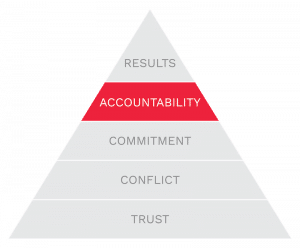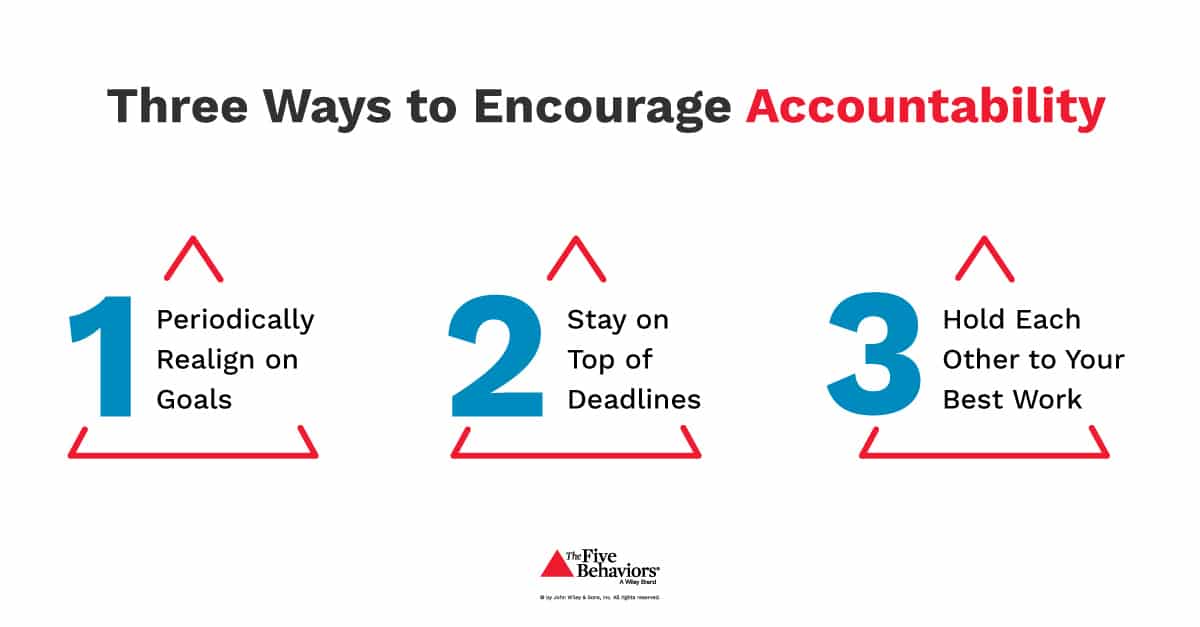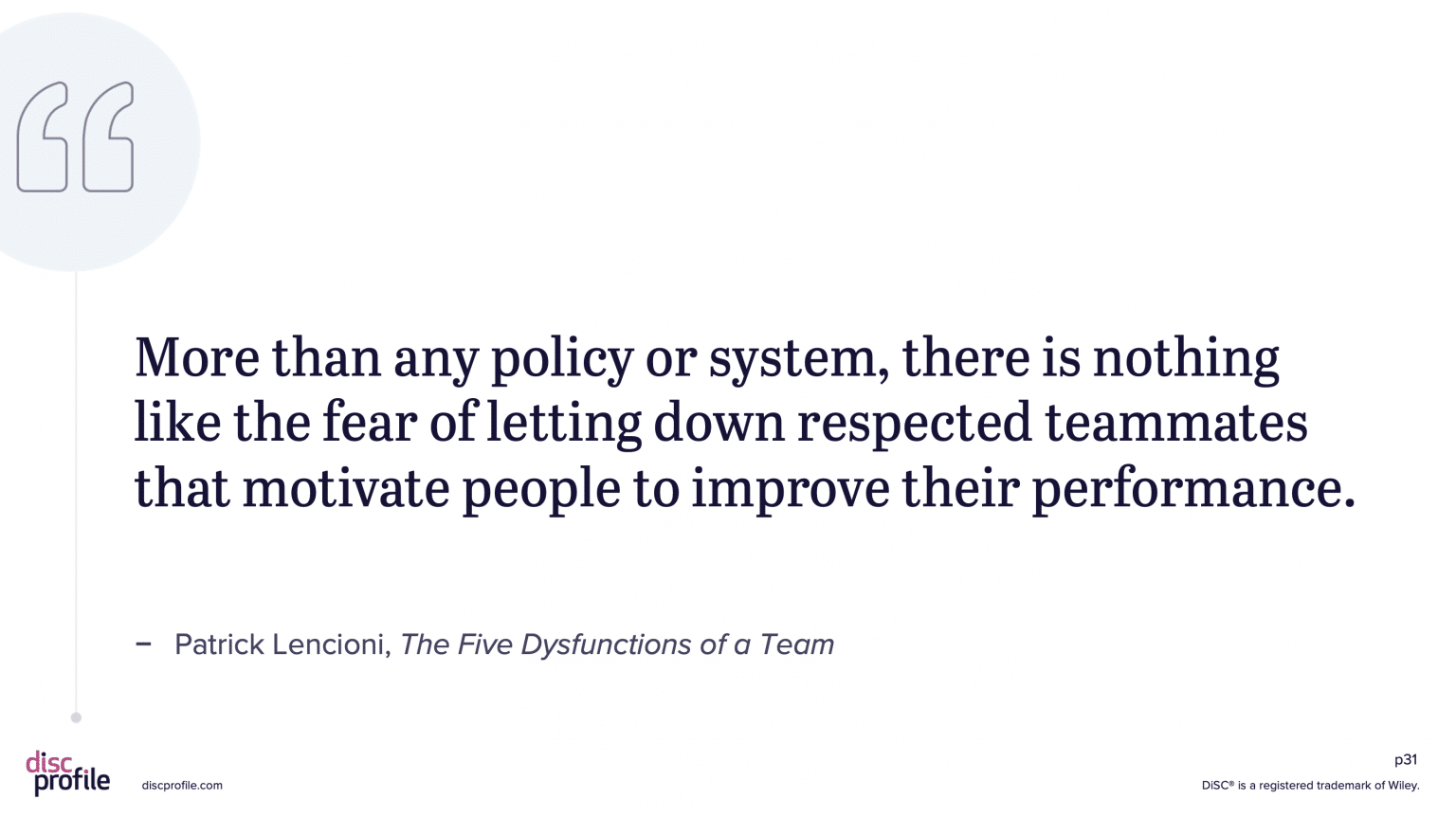If your job required you to spend 45% of your workday making balloon animals, you would surely learn how to make balloon animals. You would at least watch a few YouTube videos to get the basic skills down.
Studies show that high-performing individuals spend 45% of their workday collaborating. Yet it is rare for teamwork skills to get the same attention that individual skills do. Assessing and improving your own teamwork skills is a great way to increase your contributions at work. With some practice, you can become the person everyone likes collaborating with.
This article is the fourth in a series on how individuals can build teamwork skills. (See the first article on trust, the second article on conflict, and the third article on commitment.) We’re using the Five Behaviors® model developed by Patrick Lencioni.
What does “accountability” mean in the Five Behaviors® model?
Accountability goes beyond just doing what you said you’d do. It’s more of a mindset. It’s the courage to invite constructive criticism from your peers and to speak up about issues with others, even when it’s uncomfortable.
The Five Behaviors® Personal Development defines accountability as “the willingness of team members to call their peers on performance or behaviors that might hurt the team.”
Teams without accountability may stagnate in mediocrity, miss deadlines, and resent each other for differing standards of performance.
When you’re on a team with accountability, however, you and your teammates feel comfortable offering and accepting feedback. You feel pressure to perform, not just from supervisors but from your peers. Team members confront each other when someone doesn’t follow through on a responsibility.
How does accountability connect to commitment?
If you’re on a dysfunctional team, this kind of useful peer-to-peer accountability may seem like a dream. And true, accountability is not something teams can just switch on one day. Likewise, individuals struggle to hold colleagues accountable for many reasons.
For both teams and individuals, the way to accountability is through commitment.
In order for teammates to call each other on their actions, they must have clarity about what is expected.

As we discussed in a previous article, commitment comes when there is clarity and buy-in. The Personal Development profile says: “Commitment gives team members the courage to hold one another accountable, knowing that they’re asking their peers to live up to something they’ve already fully agreed to do.”
The Five Behaviors model is shown as a pyramid because the behaviors are built on the foundation of the behaviors that come before them.
Why is it hard to hold teammates accountable?
Practicing accountability often involves some level of interpersonal discomfort, at least at first. Few people relish confronting peers about their behavior. It’s easier just to look the other way or tell a manager.
In addition to a lack of clarity, teams struggle with accountability if they haven’t agreed on ground rules. Are team members expected to answer emails within a certain time frame? Is it OK to check phones during meetings? Should people be at their desks at certain times, or is the schedule more flexible? Is it OK to message people after work hours? It probably won’t go well to call someone out for not answering their emails the same day if your team has never set that expectation.
On good teams, coaches hold players accountable. On great teams, players hold players accountable.
People struggle to call teammates out for various reasons, depending on their personality style. Some common obstacles:
- They don’t want to “make waves.”
- They fear they will hurt a teammate’s feelings or damage relationships.
- They figure it’s quicker to redo the work themselves than confront their peer about it.
- Their peers haven’t responded well in the past to their constructive feedback, so they figure, “why bother?”
Accountability largely comes down to your comfort with receiving feedback and delivering feedback.
These are both skills that you as an individual can practice. Understanding your natural strengths and weaknesses around feedback will benefit you throughout your career.
How to get better at accountability
Accountability is a shared responsibility, but there are individual habits you can develop to make sure you’re doing your part. Modeling good accountability practices often encourages others to follow suit, as well.
To get better at accountability, try these behaviors:
- Speak up about problems.
- Go directly to the people involved.
- Show that you are open to feedback.
- Be mindful of how you offer feedback.
- Recognize when a teammate’s approach is just different, not wrong.
- Focus on solutions, not blame.
- Follow through on your commitments.
- Build on your strengths.
The Five Behaviors® Personal Development assessment will give you a personalized plan for developing better accountability habits. Some general recommendations are below.
Speak up about problems
Remember that even though it may be uncomfortable to speak up, it helps your team and organization. It is almost always easier to address problems early on, before they become bigger. If you lack the courage to speak up, you’re denying your teammates the opportunity to improve or to address your concerns.
Go directly to the people involved
Instead of complaining to colleagues or relying on managers to intervene, start a conversation with the person who is the source of the issue.
Show that you are open to feedback
Receiving critique is difficult for a lot of people. Maybe your instinct is to defend yourself when your peers hold you accountable, or maybe you totally shut down. Try to listen to feedback with an open mind. In your body language and response, show that you are grateful to your colleague for speaking up. You can go away and think about it, and if you don’t agree with their input, you can open that conversation. But take time to process and consider their words before reacting with defensiveness or spiraling into self-doubt at the thought you’ve let someone down.
Be mindful of how you offer feedback
When delivering feedback, some people are attentive to feelings, some are attentive to logic, and most fall somewhere in between. Many of us default to delivering feedback in the way we’d like to hear it. Tune in to the needs of your teammates as you balance gentleness and firmness. People may be more open to what you’re saying if you speak tactfully and with care for their feelings, but you also have to be sure that you’re not downplaying your concerns to do so. Conversely, a blunt, logical approach may feel most efficient and honest, but some teammates may close off if your edges are too sharp.
Recognize when a teammate’s approach is just different, not wrong
There’s usually more than one good way to approach a project. Depending on your personality, you may feel the urge to critique a colleague doing something in a way you wouldn’t do it. But take a second to analyze whether their way is truly inefficient, or whether it’s just different.
Focus on solutions, not blame
Concentrate your criticism on the task rather than the person. Show faith in their capability, and discuss how to move forward in a better way.
Follow through on your commitments
As you practice holding others accountable, make sure you’re shining some of that light on yourself. Be proactive in letting teammates know about possible issues so you can all discuss solutions together. Recognize what obstacles tend to stand in the way of you doing what you said you’d do.
Build on your strengths
People of all personality types have natural strengths around giving and receiving feedback. The Five Behaviors Personal Development assessment can help you understand your own. These strengths are a great foundation to build from. For example,
- If you’re naturally diplomatic, teammates may be more receptive because of your gentle approach.
- If you’re naturally objective, you can help team members realize that constructive criticism is healthy, rather than a personal attack.
- If you’re naturally goal-oriented, you’re likely to initiate difficult but necessary conversations to ensure success.
- If you’re naturally encouraging and enthusiastic, you can spur team members on to improve performance.
Be the teammate everyone wants to work with
Whether you’re part of one long-standing team or someone who works across various short-term teams, you can benefit from a teamwork skills tune-up. By focusing on your own part of the team dynamic, you’ll build teamwork muscles you can bring to any team.
In the next article, we’ll look at how embracing accountability sets you up for success with the final of the Five Behaviors: results.
Free slide decks to download: Quotes on Accountability and Quotes by Patrick Lencioni



